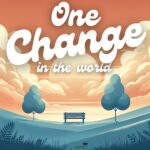
I’m just going to suggest you a theory or something. You just tell me what you think about that. I think many people, and maybe not the majority, because I just don’t know about statistics, but many people, they really deeply feel that something, they are being shaken too much. Because what they’re used to, their comfort, their idea of the world is being so much shaken and so much, yeah, like this, not destroyed, but so much shaken by these ideas. That they actually, if there are some people who are already suffering economically, but also having a hard time in society, not feeling so much control and power over what’s happening in society. And then on top of that, there are some movements that are putting in question all their ideas about how the world should be, how family should be, how life should be. This is starting to be too much. And then if you have someone, a political leader, who says, we should maybe, we should go back to traditional values, traditional family, and this is how we should. Probably people, yeah, have a lot of reason to endorse it because they would feel much safer, much more in control and much more stabilised in their views and in their perception of the world. And that would be less threatened for them. So for their wellbeing, let’s say, this makes a lot of sense that they support the people who are saying that wokism or LGBT movements are going too far. I don’t know if… I don’t like the idea of connecting it to their wellbeing. I think that people can feel this. But at the end of the day, we have to think intersectionally about power and who are the people you’re talking about. And that’s also a bit of an imagination that maybe we’re thinking of like a white working class people. There’s a lot of poor people that have been left behind in terms of class reason that are not that type of a person, that also face a lot of marginalisations due to their race, their ethnicity. And I think that it’s really the idea of thinking that making a scapegoat out of LGBT people, their families and their issues somehow hurts the wellbeing of other people. I do think that is, in my view, goes a little too far. It’s a commonly used narrative, and I do understand that political leaders can mislead people, and I think that’s wrong. And I do understand that people can be easily misled because of these feelings, that the world just doesn’t make sense anymore. And I think that there is a lot of work LGBTI movements do to try to explain ideas around like love is love, or trying to explain how a lot of things that movements are asking for are just for simple recognition. And that would maybe need a lot more allyship as well from mainstream politicians, and they have received it in some places to kind of help explain why these movements are not asking for anything that would detract from the wellbeing of other people. They’re just acknowledging that the way the world works, or how some people think it should work, has excluded many, many people. And not just now, I’m not just thinking about LGBT people, but I can think of all sorts of other marginalised people that have really been left out of this imagination of the good old days of how the world works. And without those changes, we’re asking all of those people that have been excluded and left out of that picture to just be content with not being in it, or having their lives and their experiences not being represented. Most things that LGBT people are asking for, whether it’s the right to have their families recognised, or have a family themselves, what’s the right to feel protected, that there’s no hate crimes against them. One of the main concerns for trans activists is the intense violence that trans people face in so many countries and societies. And then their issues get manipulated in mainstream politics as if they’re asking, as presented as a threat, of course, and as if they’re asking for all of these things that will radically change the world in some way when most trans organizers don’t see themselves in any way as wanting to take things away from the way other people live their lives, but certainly want a place also for trans people within our social fabric. I think it’s a little bit… I have a harder time, I guess, feeling that people should be given a free pass to say, “I don’t have to think about any changes in the world,” or “I have to think that my well-being is hurt by imagining the inclusion of some other group.”
